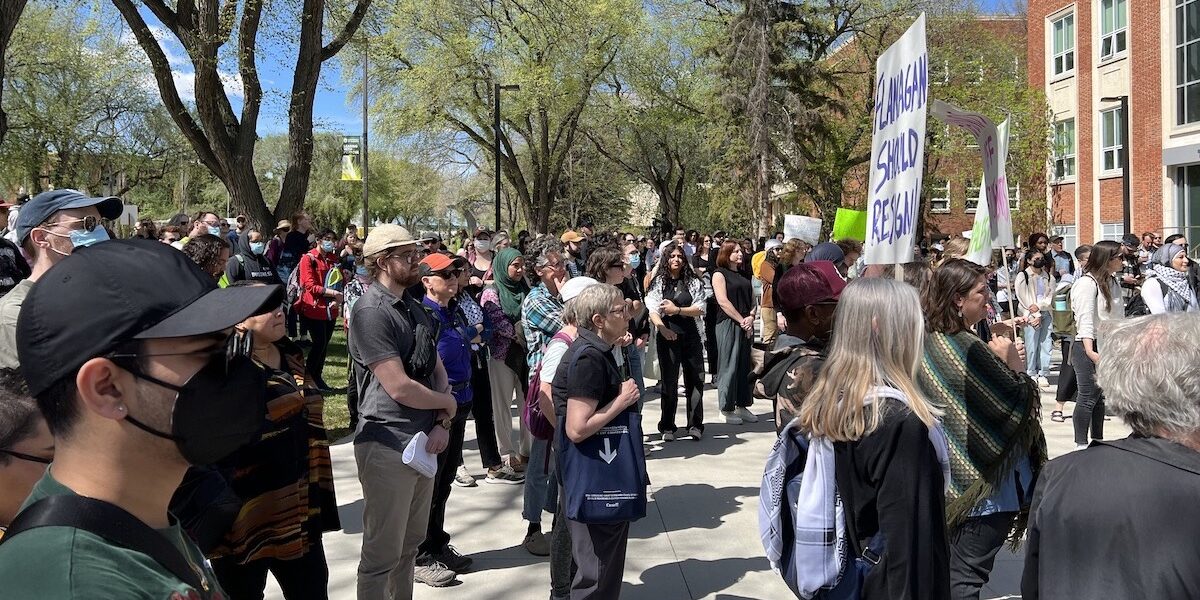Gratuitous police violence on campus in the wee hours last Saturday has obviously exacerbated the foolish blunder made by University of Alberta President Bill Flanagan when he called in the riot squad to clear out a small encampment of students protesting the ongoing destruction of Gaza.
Whether the university president came up with the brainstorm himself or was pushed into calling the cops by others, the pot is now boiling over and Flanagan’s departure is clearly on the growing protest movement’s list of objectives.
About 400 University of Alberta students, professors, staff, and even some of those dreaded “outsiders” gathered outside the campus administration building at earlier this week and loudly demanded his resignation for siccing billy-club wielding Edmonton Police Service cops in miliary-style fatigues in on the peaceful Palestine solidarity encampment.
There were enthusiastic chants of “Hey! Hey! Ho! Ho! Flanagan has got to go!”
But the demonstration organized by Faculty for Palestine Alberta was only a part of the growing political problem faced by President Flanagan, who appears to have made things worse for himself with widely mocked claims in two statements published on the university’s website that the encampment “put the university community’s safety at risk.”
The faculty group published an open letter “against the brutalization of students at the hands of administrators at the U of A” that as of yesterday had been signed by 255 faculty members and 807 staff, students, parents, alumni and community members.
In addition to disclosure and divestment of university investments in Israel, the letter demands amnesty for all protesters caught up in the police raid, an apology and complete retraction of threats of discipline by campus security employees against protesters, and Flangan’s resignation.
Also, the University of Calgary’s respected law blog, ABlawg.ca, published “An Open Letter Regarding the Response to Recent Protests at the Universities of Alberta and Calgary” signed by 19 members of the U of C and U of A law faculties.
The letter expresses the signatories’ “deep concern about the violent infringement of students’ right to protest by the Calgary Police Service, Edmonton Police Service, University of Calgary, and University of Alberta on May 9 and 11, 2024.”
Among other things, that letter calls on the Alberta Crown Prosecution Services to withdraw all charges stemming from the breakup of encampments on both campuses, the referral of both clearances to the Alberta Serious Incident Response Team for investigation, and revocation of trespass notices and removal of restrictions on students, staff, faculty, or alumni to be on campus stemming from the police actions.
This has obviously worried the Premier’s Office – which is widely suspected of having played some role in the two university administrations’ decisions to call in the cops. At any rate, Premier Danielle Smith told reporters she would ask ASIRT to investigate, although no one should expect that to result in meaningful criticism of the two police services’ actions.
On Monday, the U of A’s academic, non-academic and student unions jointly signed a letter to President Flanagan expressing “deep concern and disappointment” with the clearances.
“The visual evidence of the forceful removal of protestors has sent a chilling message to students, faculty, and staff, suggesting that dissent will be met with aggression rather than dialogue,” the union letter said. “This approach not only undermines the core value of freedom of expression but also poses significant risk to the reputation and perceived safety of our university, which should be a place of learning, not fear and intimidation.”
Yesterday’s protest was addressed by former U of A Associate Dean of Equity, Diversity, and Inclusion Natalie Loveless, who resigned Monday in response to the police violence and Flanagan’s statements, which she said in her resignation letter advanced “a description of events at odds with what I personally witnessed.”
In a list of requests to university leadership, Dr. Loveless urged the university to “immediately stop making unsubstantiated or spurious claims that the encampment was a danger and protesters were potentially violent.”
“The encampment was peaceful and modeled solidarity between Palestinian, Jewish, and Indigenous communities and allies,” she wrote. “None of the supposed threats to safety outlined in President Flanagan’s letters corresponds to my personal observations or the testimonies of many others who visited the camps.”
Whether President Flanagan can hunker down and ride his bad reviews out now depends on how his actions are seen throughout the broader university community.
University presidents are not elected, but there can come a point when even a conservative board of governors can no longer tolerate a president who has lost the respect of too many students and faculty. This is just practical politics.
Former NDP leader weighs in on the dangers of venturing into ‘Liberal-land’
In a rare post on his Grumpy Old Socialist blog, former Alberta NDP leader Brian Mason has weighed in on Alberta Federation of Labour President Gil McGowan’s departure from the NDP leadership race and the NDP’s troubles winning back working class voters.
“Why are working people abandoning the NDP?” asked Mason. “In part, it’s because the NDP has abandoned them.”
“This phenomenon can be observed world-wide, as social democratic parties move to the right in an attempt to reach their elusive pot of gold,” Mason wrote. “Workers feel abandoned and become prey for conservative and far-right parties.”
Mason pointed to how several union members in the NDP’s 2015 caucus lost their nominations or decided not to seek reelection. “One reason was a desire by the party leadership to attract more professionals and business people, including those with connections to the energy industry. Some long term NDP activists were also passed over in pursuit of these goals.
“We are seeing the results of this policy today, as a huge liberal wave threatens to drown the social democratic elements of the party,” he said.
“If the Alberta NDP is to avoid permanently veering off into Liberal-land, it needs the labour movement more than ever,” Mason concluded.
It’s worth a read.



